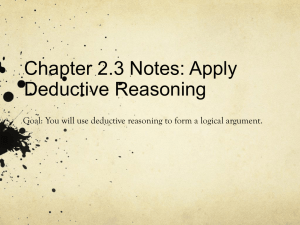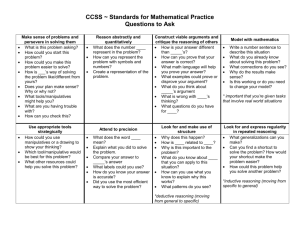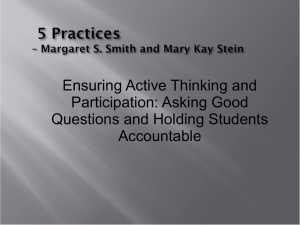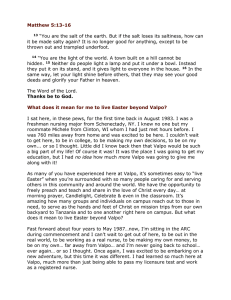here - Phil Woodward
advertisement
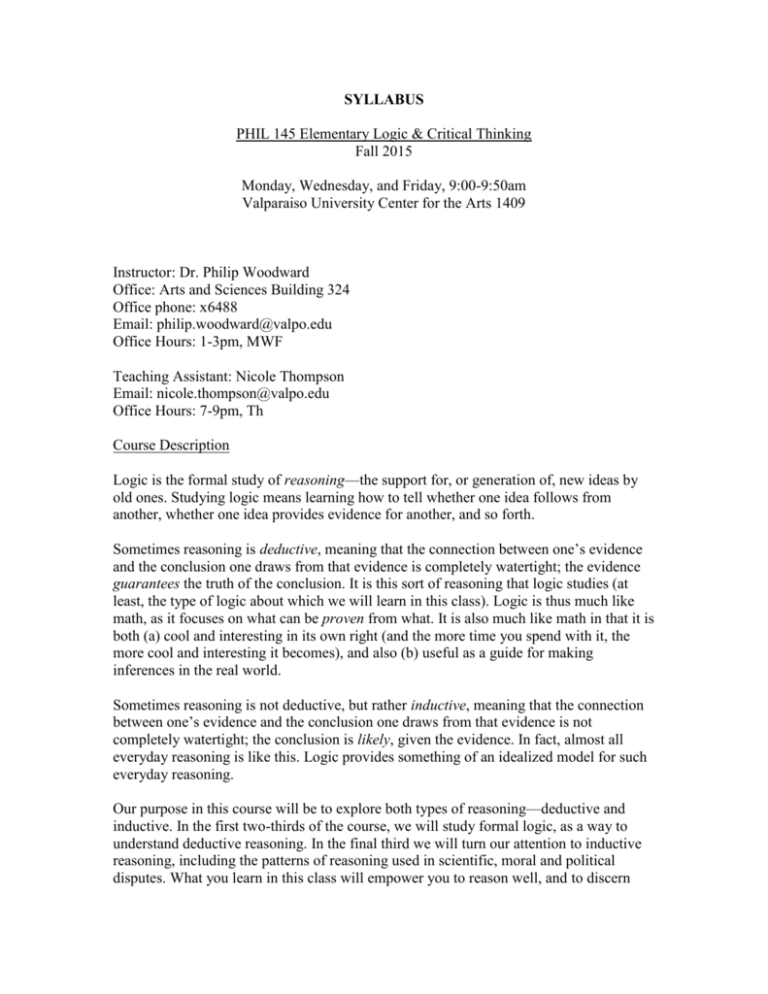
SYLLABUS PHIL 145 Elementary Logic & Critical Thinking Fall 2015 Monday, Wednesday, and Friday, 9:00-9:50am Valparaiso University Center for the Arts 1409 Instructor: Dr. Philip Woodward Office: Arts and Sciences Building 324 Office phone: x6488 Email: philip.woodward@valpo.edu Office Hours: 1-3pm, MWF Teaching Assistant: Nicole Thompson Email: nicole.thompson@valpo.edu Office Hours: 7-9pm, Th Course Description Logic is the formal study of reasoning—the support for, or generation of, new ideas by old ones. Studying logic means learning how to tell whether one idea follows from another, whether one idea provides evidence for another, and so forth. Sometimes reasoning is deductive, meaning that the connection between one’s evidence and the conclusion one draws from that evidence is completely watertight; the evidence guarantees the truth of the conclusion. It is this sort of reasoning that logic studies (at least, the type of logic about which we will learn in this class). Logic is thus much like math, as it focuses on what can be proven from what. It is also much like math in that it is both (a) cool and interesting in its own right (and the more time you spend with it, the more cool and interesting it becomes), and also (b) useful as a guide for making inferences in the real world. Sometimes reasoning is not deductive, but rather inductive, meaning that the connection between one’s evidence and the conclusion one draws from that evidence is not completely watertight; the conclusion is likely, given the evidence. In fact, almost all everyday reasoning is like this. Logic provides something of an idealized model for such everyday reasoning. Our purpose in this course will be to explore both types of reasoning—deductive and inductive. In the first two-thirds of the course, we will study formal logic, as a way to understand deductive reasoning. In the final third we will turn our attention to inductive reasoning, including the patterns of reasoning used in scientific, moral and political disputes. What you learn in this class will empower you to reason well, and to discern when others, who try to influence your beliefs, are reasoning well or poorly. Some aspects of logic are intuitive and simple. Other aspects are extremely confusing and difficult. Logic is not the sort of thing you either innately grasp or innately fail to grasp. It is, rather, the sort of thing you can master if and only if you work at it diligently. Course Objectives Developing a vocabulary for recognizing, reconstructing, and evaluating arguments Learning how to use formal logic to construct proofs and test deductive inferences Becoming acquainted with the ways evidence can be used well or poorly in scientific, moral and political discourse Course Requirements / Grading Regular attendance Homework First Exam Second Exam Final Exam Argumentation Project 30% 15% 15% 20% 20% Homework is due once per week, usually (but not always—see the schedule!) on Mondays. Typically, homework assignments will include three sets of questions/problems, one for each class session in the previous week. I will make the day’s homework set available on Blackboard before class that day (at the latest). Homework assignments will be graded in one of two ways: Traditional grading: each correctly answered homework item earns 1-4 points, and each incorrectly answered item earns no points (or in rare cases partial points). Adequacy-based grading: the assignment earns (a) full credit if complete and demonstrates competence in relevant concepts/skills; (b) 80% credit if complete but demonstrates substantial error or misunderstanding; (c) 60% credit if incomplete and demonstrates pervasive error or misunderstanding. I will not announce ahead of item which manner of grading will be employed on a given assignment. The Argumentation Project will involve (1) a 2-3pp. analysis of the arguments in an article on a controversial topic, (2) commentary on this analysis from four of your peers, and (3) a 4-6pp. dialogue about the topic. The last several class meetings will be devoted to this project, so under no circumstances should you plan to be absent on those days. More detailed instructions for this project will be available on Blackboard later in the semester. Required Texts Patrick Hurley, A Concise Introduction to Logic, Twelfth Edition. Cengage Learning, 2011. ISBN: 9781285196541 Other readings available on Blackboard Course Policies Attendance: It is expected that you will be in attendance, on time, and prepared for every scheduled class session. While there are no excused absences in this class*, you are entitled to two “free” absences. Each additional absence will result in a 2% deduction from your final grade. Chronic tardiness will result in grade penalties as well. *Absences owing to participation in VU athletic events, religious observances, or grave medical emergencies do not count toward your “free” absences, if these absences are properly documented. Late work: Homework is due in person at the beginning of class. No late work will be accepted, except in cases of family emergency or hospitalization (proper documentation required). Exams cannot be taken late, apart from an emergency circumstance, later documented. If you have a schedule conflict, you may take an exam earlier than scheduled. However, you must notify me at least ten days in advance to arrange for an alternate day/time. Honor Code: The Honor Code must be written and signed on every assignment and exam. In accord with the Code, all students must pledge not to give or receive unauthorized aid. Additionally, students are obligated to report violations of the Honor Code to the Honor Council. Violations may result in failing this course or in being suspended or expelled from the University. For details see: http://www.valpo.edu/student/honorcouncil/honorcode.php. In this course, unauthorized aid includes: • Collaboration of any kind on exams. • Consulting any supporting materials during exams, other than those explicitly sanctioned by the instructor. • Attempting to pass off someone else’s work as your own. • Copying homework. Students are, however, encouraged to assist one another in understanding course material and in solving difficult homework problems. Email and class cancelation: Email is the best way to communicate with me. Expect a reply within 24 hours on weekdays, and inconsistent replies on the weekends. I do not answer student questions about exams in the 24 hours preceding the exam. If I need to communicate with you, I will use your Valpo email address. This is also how I will alert the class in the event of an unscheduled class cancelation. I expect that you are checking your Valpo email at least once per day. Academic support services: If you find that you are struggling or feeling confused or frustrated, come to office hours or email me requesting an appointment. The next step is to use the Academic Success Center (ASC) online directory (valpo.edu/academicsuccess) or contact the ASC (academic.success@valpo.edu) to help point you in the right direction for academic support resources for this course. Valpo’s learning centers (Writing Center, Language Resource Center, and Academic Success Center) offer excellent support services free of charge. Disability support: Please contact Mr. Zebadiah Hall at Disability Support Services (zebadiah.hall@valpo.edu), if you believe you have a disability that might require a reasonable accommodation in order for you to perform as expected in this class. Mr. Hall will work with you and me directly to make sure you receive any reasonable accommodation needed as the result of a disability. TENTATIVE SCHEDULE Introducing Arguments W 8/26 F 8/28 1.1 Arguments, Premises, and Conclusions, 1.2 Recognizing Arguments M 8/31 W 9/2 F 9/4 *HW1 due 1.3 Deduction and Induction, 1.4 Validity, Truth, Soundness, Strength, Cogency 1.5 Argument Forms: Proving Invalidity M 9/7 W 9/9 *HW2 due / 1.6 Extended Arguments Clifford, “The Ethics of Belief” [BLACKBOARD] Propositional Logic F 9/11 6.1 Symbols and Translation M 9/14 W 9/16 F 9/18 *HW3 due / 6.2 Truth Functions, 6.3 Truth Tables for Propositions 6.4 Truth Tables for Arguments, 6.5 Indirect Truth Tables 6.6. Argument Forms and Fallacies M 9/21 W 9/23 F 9/25 *HW4 due / Review Day EXAM 7.1-7.2 Rules of Implication I&II M 9/28 W 9/30 F 10/2 7.3 Rules of Replacement I 7.4 Rules of Replacement II NO CLASS M 10/5 W 10/7 F 10/9 *HW5 due / 7.5 Conditional Proof 7.6 Indirect Proof, 7.7 Proving Logical Truths NO CLASS Predicate Logic M 10/12 *HW6 due / 4.1 The Components of Categorical Propositions, 4.3 Venn Diagrams and the Modern Square of Opposition W 10/14 8.1 Symbols and Translation F 10/16 8.2 Using the Rules of Inference, 8.3 Quantifier Negation Rule M 10/19 W 10/21 F 10/23 *HW7 due 8.4 Conditional and Indirect Proof, 8.5 Proving Invalidity FALL BREAK M 10/26 W 10/28 F 10/30 *HW8 due / 8.6 Relational Predicates and Overlapping Quantifiers 8.7 Identity *HW9 due / Review day M 11/2 EXAM Inductive Reasoning W 11/4 Reread: 1.3 Deduction and Induction, 1.4 Validity, Truth, Soundness, Strength, Cogency F 11/6 9.1 Analogical Reasoning, 9.2 Legal Reasoning M 11/9 W 11/11 F 11/13 12.1 Evaluating Statistics, 12.2 Samples Stephen Carey, “Establishing Causal Links” [BLACKBOARD] *HW10 due / 13.1 The Hypothetical Method, 13.2 Hypothetical Reasoning: Four Examples from Science M 11/16 13.4 The Tentative Acceptance of Hypotheses Moral and Legal Reasoning W 11/18 F 11/20 M 11/23 W 11/25 F 11/27 NO CLASS [Thanksgiving] NO CLASS [Thanksgiving] NO CLASS [Thanksgiving] M 11/30 W 12/2 F 12/4 *HW11 due M 12/7 W 12/9 F 12/11 Argumentation Project Peer Review, Day 2 Argumentation Project Peer Review, Day 1 *Argumentation Project Due / Review day FINAL EXAM 12/16 8-10



